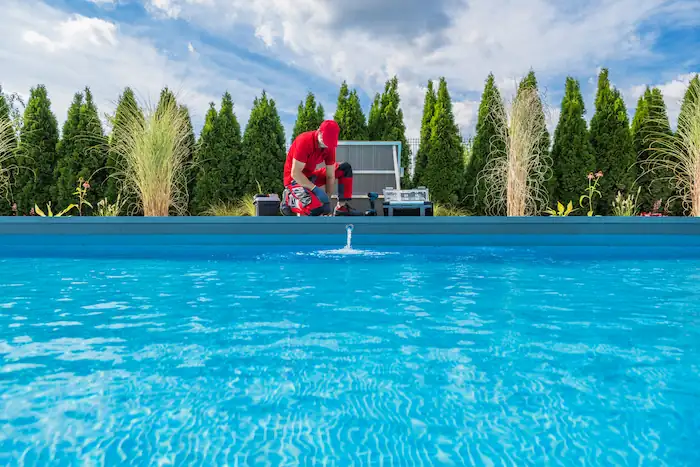How to Remove Calcium Buildup On Pool Tiles: Removing Calcium Scale and Buildup Effortlessly

Battling the bad guys of calcium buildup on your pool tiles? We've got what causes it, how to win this battle effectively, and prevent it from coming back later. Armed with the appropriate knowledge and techniques, you can make your pool look beautiful and function well all on your own with or without the need for professional services or harsh chemical treatments.
What Is Calcium Buildup and Why Does It Happen?
A build-up of calcium comes up as a white or grayish crust on your pool tiles and results from the imbalance in calcium hardness and pH levels in your pool water. Common causes can include things like water evaporation and even the natural hardness found within your tap water, which would then concentrate minerals on the surface of the tile which is what causes the staining.
Identifying Your Pool Tile Deposits: Is It Calcium Carbonate or Calcium Silicate?
Understanding the type of calcium buildup on your tiles is crucial for choosing the correct cleaning method:
- Calcium Carbonate: Softer and whiter; forms in water with higher pH.
- Calcium Silicate: Harder and darker; appears in pools with high alkalinity.
Essential Tools for Removing Calcium Buildup
A few key tools will make the removal process easier:
- Pumice Stone: Ideal for soft calcium carbonate on swimming pool tiles; use gently to avoid scratches.
- Stiff Pool Brush: Helps scrub off looser deposits and is a fundamental step in tile cleaning.
- Calcium Remover Products: Useful for tougher cases, especially silicate deposits.

Step-by-Step: Using a Pumice Stone on Pool Tiles
Using a pumice stone is effective for scrubbing away soft calcium deposits. Here’s how to use it properly:
- Wet the stone and tiles for effective tile cleaning.: This prevents scratching the surface of your pool.
- Gently Scrub: Apply the stone to the deposits with mild pressure to remove the calcium.
- Rinse Thoroughly: Remove any residue to prevent redeposits.
When to Consider Muriatic Acid for Tough Buildups
Muriatic acid is powerful against stubborn calcium silicate deposits but must be handled with care:
- Protect yourself when trying to remove the calcium or during any pool cleaning activities.: Wear gloves and goggles.
- Dilute properly: Follow manufacturer's guidelines for dilution.
- Apply carefully: Use only on areas with heavy buildup, and rinse well.
Using Vinegar for Mild Calcium Deposits: A Gentle Solution
For less severe buildups, vinegar is a safe and effective option to remove calcium from pool tiles:
- Mix a Solution: Combine equal parts vinegar and water.
- Apply to Tiles: Spray or sponge the solution onto the tiles.
- Let sit and scrub: Allow the solution to work for a few minutes before scrubbing off the calcium stain.
"Vinegar isn't just for salads; it's a gentle warrior in the battle against calcium, proving that sometimes the simplest solutions are the most effective."

DIY vs. Professional Cleaning: Making the Right Choice
Whether to handle calcium removal from your pool yourself or hire a professional depends on several factors:
- Extent of buildup: Severe buildup of calcium on swimming pool tiles might require professional equipment.
- Comfort with chemicals: If using strong chemicals feels daunting, consider a pool service.
How to Maintain Optimal Calcium Levels in Your Pool
Keeping calcium levels in check is essential to avoiding future calcium buildup.
- Regular testing to prevent future calcium buildup.: Check your pool’s calcium hardness and pH levels frequently.
- Adjust as needed: Use pool chemicals to maintain the recommended balance.
Effective Prevention Strategies to Keep Calcium Buildup at Bay
Preventive measures can greatly reduce buildup:
- Use a Pool Cover: Minimize evaporation, which concentrates calcium.
- Adjust Water Chemistry: Proactively manage pH and alkalinity to prevent future calcium buildup and maintain a clean pool.
- Regular Tile Brushing: Detach forming deposits before they harden.
Routine Pool Maintenance: A Checklist to Avoid Future Buildup

The best way of preventing calcium and hard water problems is through regular maintenance of your pool, hence, protecting your surface in the pool.
- Frequent Cleaning: Brush and vacuum the pool weekly.
- Monitor Water Chemistry: Adjust chemicals as necessary to maintain a clean pool.
- Inspect Pool Equipment: Ensure everything is in good working order to avoid imbalances.
Striking a balance between detailed information, straightforward bullet points, and actionable steps, this guide presents a balanced and reader-friendly approach to managing and preventing calcium buildup in pool tiles. If you're looking for professional pool inspection service in Corpus Christs, TX choose Pool RX today!
FAQ: Managing Calcium Buildup on Pool Tiles
- It is commonly caused by a chemical imbalance in the pool water; mostly there will be very high levels of calcium hardness and pH.
- Calcium Carbonate: Hard, white deposits are more difficult to remove.
- Calcium Silicate: grayish-white deposits of greater hardness and resistance.
- Yes, introduction of calcium hypochlorite into pool water may raise the level of pH, which may cause scaling.
- Pumice Stone: Best for soft calcium carbonate deposits.
- Stiff Pool Brush: Good for scrubbing looser deposits.
- Professional cleaning is reasonably needed for severe, widespread buildup and for effective removal of calcium requiring safe chemical handling.
Discover More Blog Posts
Explore our collection of informative and engaging blog posts.

How to Maintain a Clean and Healthy Pool
.jpg)
How to Maintain a Clean and Healthy Pool
%20(2).jpg)
How to Maintain a Clean and Healthy Pool
Discover Peace of Mind with Our Leak Detection & Inspection Services
Concerned about leaks or the overall health of your pool? Pool RX LLC is your trusted partner for comprehensive leak detection and pool inspection. Our expert team utilizes advanced technology to identify and address issues efficiently, ensuring your pool remains a sanctuary of relaxation and enjoyment. Schedule your service today and swim with confidence, knowing every drop is where it should be.


